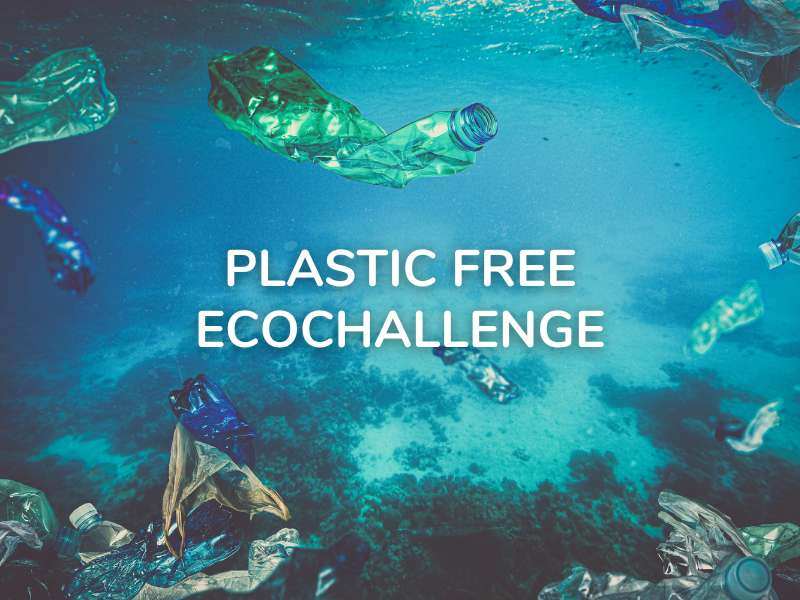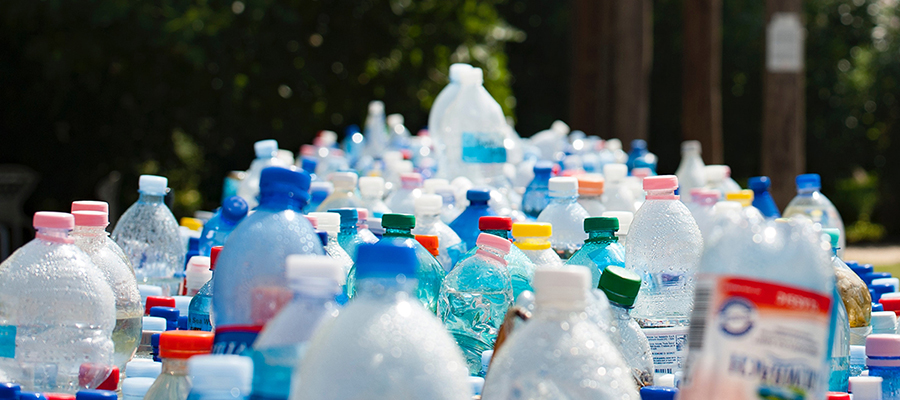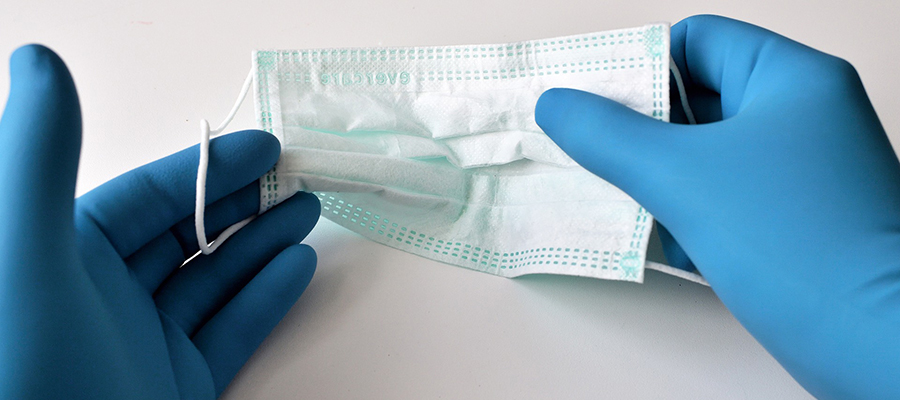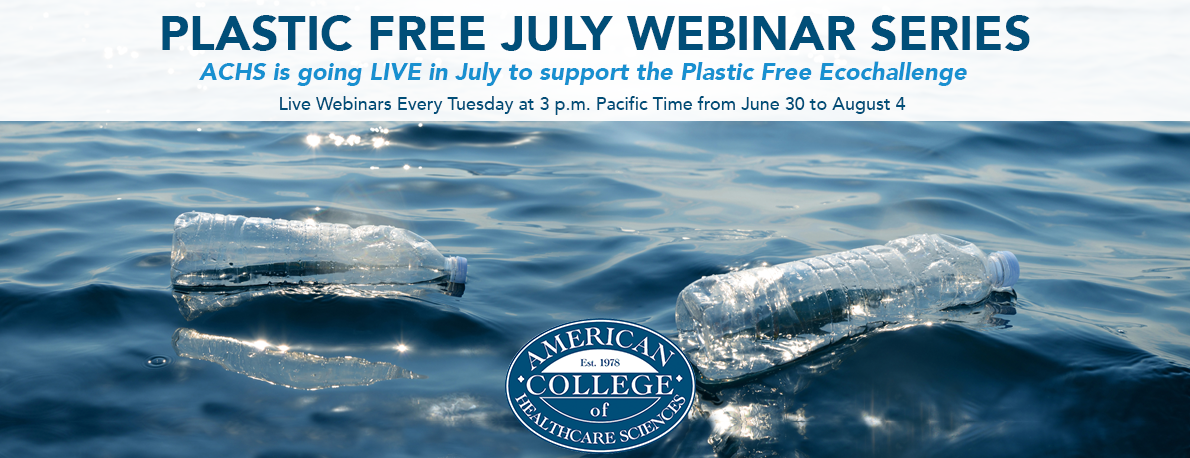This past July, ACHS staff and faculty participated for the second time in the Plastic Free Ecochallenge. The challenge is a month-long opportunity to actively refuse and reduce single-use plastics in our everyday lives and work towards a plastic-free world. Participants logged personal daily or one-time actions taken to reduce plastic in the environment, shared progress, and interacted with fellow Ecochallengers.
Sustainability is one of ACHS’ core values, and as a Certified B Corporation, we consistently seek new ways to support the conservation of natural resources and ecological balance. Our 2023 B Corporation Impact Report highlights our continued commitment to positive environmental impacts and community engagement. The 2024 Plastic Free Ecochallenge was a fun and impactful way to continue this mission!
Cutting Single-Use Plastics for a Healthier Planet and Future
Reducing single-use plastics is crucial for both environmental and health reasons. These plastics, primarily made from fossil fuel-based chemicals, are often used for just a few minutes, can take hundreds of years to decompose, and contribute significantly to the growing problem of plastic pollution. Examples include plastic bottles, straws, cups, cutlery, and disposable bags1.
They litter our landscapes, clog our waterways, and harm wildlife that mistake them for food. The production and disposal of single-use plastics release harmful chemicals and greenhouse gasses into the atmosphere, exacerbating climate change. By minimizing our reliance on these plastics, we not only protect ecosystems and biodiversity but also promote a more sustainable and healthier planet for future generations2.
10 Ways to Cut Down on Single-Use Plastics
There are many simple ways to reduce the use of single-use plastics in your daily life. Here are 10 actions you can take to contribute to a healthier, happier planet:
- Carry Reusable Bags: Always carry reusable shopping bags for groceries and other purchases. Keep a few in your car or bag to ensure you have them handy.
- Use Refillable Water Bottles: Invest in a good-quality reusable water bottle and refill it throughout the day instead of buying bottled water.
- Bring Your Own Coffee Cup: If you buy coffee on the go, bring your own reusable cup to avoid using disposable ones.
- Avoid Plastic Straws: Opt for reusable straws made of stainless steel, bamboo, or silicone. Many places also offer paper straws as an alternative.
- Use Reusable Food Containers: Store food in reusable containers instead of plastic wrap or single-use plastic bags. This includes bringing your own containers for takeout or leftovers from restaurants.
- Shop at Farmers Markets: Buying fresh produce from farmer's markets can reduce plastic packaging, as items are often sold loose or in reusable bags.
- Switch to Bar Soap and Shampoo: Use bar soap and solid shampoo bars instead of liquid soap and shampoo in plastic bottles.
- Buy Refillable Products: Choose refillable products like cleaning supplies, where you can refill the original container instead of buying a new one.
- Use Cloth Napkins and Towels: Replace paper towels and napkins with cloth alternatives that can be washed and reused.
- Support Businesses that Reduce Plastic Use: Patronize companies and restaurants that have committed to reducing their plastic footprint.
Implementing even a few of these changes can significantly reduce single-use plastic consumption and contribute to a more sustainable lifestyle. Get started today!
ACHS Plastic Free Team Impact
ACHS’ team, the Eco-Ambassadors, undertook a strong commitment to the Plastic Free Ecochallenge, rallying to reduce single-use plastics and embrace sustainable alternatives. This initiative saw the team completing actions such as limiting the use of disposable cups and bottles, reducing water usage, opting for meatless meals, and more. These simple actions all contribute to the overall reduction of plastic pollution and can also inspire a lasting culture of environmental responsibility. Here’s a snapshot of the team stats and actions that were completed during the challenge:
Total points earned: 4,410
Number of ACHS participants: 16
Team Impact by the Numbers:
Plastic Free Insights from ACHS Faculty and Staff
“We grow our own lettuce! Lettuce regenerates and grows so quickly. It’s been amazing to be able to pick fresh greens for a salad or just a few leaves for a sandwich. Not only are we avoiding all of the plastic clamshells and bags that lettuce and salad often come in, we're also not wasting any greens and get to enjoy gardening.” - Tracey Abell, ACHS President
“An easy switch for those who like sprouts is to start your own lentil sprouts instead of buying them, as store-bought lentils usually come in plastic. I have a reusable lid that fits on a quart-sized mason jar (though a clean sock w/rubber band works as well). I just rinse mine and leave them in the dish drainer as they sprout. Easy, crunchy, and delicious!” - Jacqui McGrath, Professor
“I use metal straws all the time now for smoothies and fountain drinks. They’re easy to clean and reusable.” - Cami Asmussen, Senior Instructional Designer and LMS Administrator
“This is a journey, it's amazing how many items are plastic, especially when you have children. I believe it is a transition to using less plastic, and we are absolutely incorporating it into our family.” - Ilana Rose Frigaard, Chief Operating Officer
The 2024 Earth Month Challenge
In April 2024, ACHS also participated in the Earth Month Ecochallenge: Conservation initiative. The challenge similarly emphasized small, incremental actions that collectively lead to significant environmental benefits. The 31-person ACHS team demonstrated impressive results, earning 6,251 points and ranking 132nd out of 860 teams. The initiatives taken showed how small personal actions can lead to significant environmental benefits and inspire broader corporate responsibility.
The ACHS Eco-Ambassadors plan to remain committed to the planet well after the Ecochallenge. Conservation is a continuous endeavor and a fundamental aspect of our mission. We hope our sustained dedication to positive environmental impacts and community engagement will inspire others to join the cause in 2024 and beyond!
Want to learn more about ACHS?
Read about our Mission
Explore Programs in Holistic Health.
Speak to an Advisor to get all of your questions answered!
This article is for informational purposes only. The information included is representative of industry trends as provided in the references. Please refer to third-party sites for additional information. ACHS does not guarantee graduate employment or other placement. Note, that professional success is achieved by a number of factors beyond education and experience, including soft skills, work ethic, integrity, and other skills that may not be developed through education and training alone.
Sources:
-
Natural Resources Defense Council. (2020, January 9). Single-Use Plastics 101. NRDC. Retrieved July 8, 2024, from https://www.nrdc.org/stories/single-use-plastics-101
-
Public Broadcasting Service (PBS). (2023, November 1). How Single Use Plastics Hurt Our Oceans and Warm Our Planet. PBS. Retrieved July 8, 2024, from https://www.pbs.org/wnet/peril-and-promise/2023/11/how-single-use-plastics-hurt-our-oceans-and-warm-our-planet/






